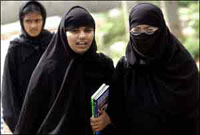Muslim women want Western freedoms but reject Western culture
When we speak about different countries we shouldn’t forget that societies also differ greatly. Each society has its own rules, however not all the members of the society are pleasant with these rules. Today the muslim society is the most evident example of this problem, especially when speaking about the rights of muslim women.

A new Gallup survey - which conducted 1,000 face-to-face interviews in countries including Egypt, Iran, Jordan, Lebanon, Morocco, Pakistan, Saudi Arabia and Turkey -- found most Muslim women wanted the right to vote freely, to drive on their own, to work outside the home, and even to undertake leadership roles within their society.
In Lebanon, 97 percent of women thought they should be able to vote -- the highest percentage of the countries surveyed. Pakistan had the lowest rate, with 68 percent.
In Afghanistan, 92 percent of women and 87 percent of men thought women should have voting rights.
Though Muslim women acknowledged women had more rights in the West, the study found they didn't want their own societies to adopt Western values. The Gallup study concluded Muslim women tended to regard Western culture as morally corrupt and obsessed with sex, drugs and rock'n'roll.
Dalia Mogahed, executive director of Gallup Muslim Studies, who conducted the survey, says Muslim women see a breakdown of traditional values in the West. "Sexual freedom portrayed in Western media is actually degrading to women, not a form of liberation."
Their criticism wasn't reserved only for the West, however. Most women in the study also objected to extremism, divisiveness, and rampant political and economic corruption in their own societies, ABCNews reports.
The Gallup study shows that the lack of unity, extremism and political corruption were the main problems with their societies. Inequality between the sexes, criticized by many in the West, barely registered with Muslim women. No more than 2 percent of women in Egypt and Morocco said it was an issue. In the more-westernized countries of Lebanon and Turkey, 11 percent said gender inequality was a problem, The Washington Post says.
Source: agencies
Prepared by Alexander Timoshik
Pravda.ru
Discuss this article on Pravda.ru English Forum
Subscribe to Pravda.Ru Telegram channel, Facebook, RSS!





